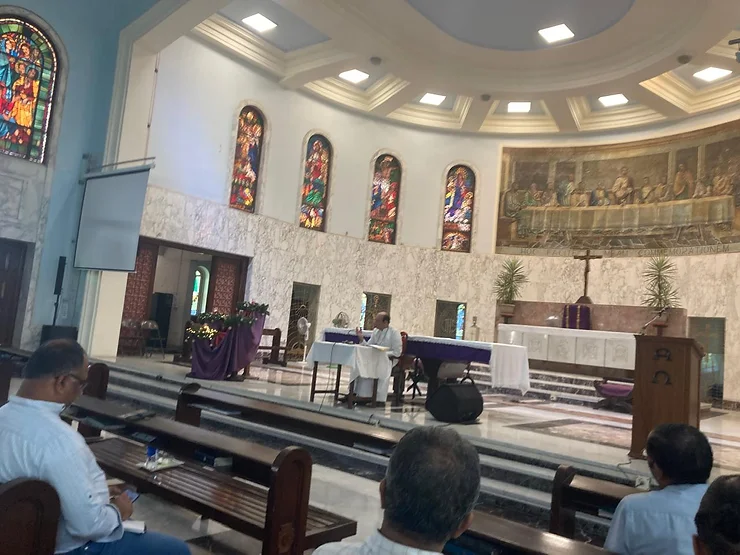The clergy of the Archdiocese of Bombay on Dec. 12 convened at St. Pius X Seminary, where Cardinal Oswald Gracias reflected on the recently concluded Synod on Synodality.
In his address following a prayer service, Cardinal Gracias described the Synod as a “historic milestone for the Church,” captured in a comprehensive final document of 155 paragraphs.
The Cardinal emphasized that this document is “not merely a summary but a roadmap” for the Church’s ongoing mission and transformation, deeply rooted in Scripture, tradition, and the lived experiences of the People of God.
A Journey of Communion and Mission
The Cardinal traced the Synod’s three-year journey, beginning with the Church’s call to walk together in the spirit of the disciples’ encounter with the Risen Christ.
He highlighted how this process fostered harmony amid diversity and united the faithful in a shared mission.
The final document challenges the Church to confront human suffering and injustice, resonating with the realities of the modern world.
Synodal Roots at the Grassroots
Cardinal Gracias recounted the Synod’s grassroots beginnings, progressing through diocesan, national, and continental stages. At the Archdiocesan Synod meeting in June 2022, five key areas of concern were identified:
- A Faith-filled Church: With faith as the cornerstone of mission.
- A Collaborative Church: Promoting shared participation in the Church’s vision and mission.
- An Inclusive Church: Creating a welcoming community for all.
- A Relevant Church: Responding to the signs of the times in the spirit of Vatican II.
- A Church for the Poor: Advocating justice and compassion for the marginalized.
During the Continental stage in Bangkok, the Synod’s vision for Asia aligned with the Federation of Asian Bishops’ Conferences (FABC) mission, reaffirming that every baptized Christian is a missionary disciple embracing unity in diversity.
A Spirit-Led Process
The Synod began with a three-day spiritual retreat, setting a tone of prayerful discernment. Cardinal Gracias noted that the first session featured unprecedented inclusivity, with 368 participants, including 96 non-bishops, granted voting rights.
A “coffee table system” fostered collaborative discussions, described as “conversation in the Spirit,” and included reflective silences to deepen discernment.
Despite challenges such as the absence of parish priests and occasional lapses in focus, the Synod maintained an atmosphere of openness.
The Instrumentum Laboris (working document) laid the foundation for further dialogue in the second session, scheduled for October 2024.
The Call to Repentance
Before the second session, synod members participated in a retreat culminating in a penitential liturgy presided over by Pope Francis on October 1 at St. Peter’s Basilica.
Pope Francis underscored the importance of repentance, asking, “How could we be credible in mission if we do not recognize and acknowledge our mistakes?”
The liturgy featured testimonies from those affected by abuse, war, and indifference, with confessed sins including offenses against peace, creation, Indigenous populations, and migrants.
The Synod stressed that repentance, conversion, and God’s mercy are prerequisites for synodality. Communal healing and dialogue were identified as pathways to renewal.
Eucharist, Mission, and the Marginalized
Central to the Synodal vision is the Eucharist, described as the source of unity and nourishment for the Church’s mission.
The Synod reaffirmed the Church’s preferential option for the poor, calling for systemic change and deeper engagement with other faiths to promote peace.
The Synod also highlighted the inclusion of marginalized groups, such as migrants, refugees, people with disabilities, and the elderly, alongside the integral role of youth in fostering intergenerational relationships.
Women’s Role in the Church
The final document emphasized integrating women’s contributions, reflecting their dignity as co-heirs in Christ, and enhancing the Church’s capacity for holistic witness.
A Prophetic Mission and Future Outlook
The Church is called to be a prophetic voice addressing systemic injustices, ecological crises, and digital ethics.
Transparency in governance and collaboration with other Christian communities and religions were also emphasized.
Looking ahead, study groups in 2025 will present reports on key areas, including the relationship between Eastern and Latin Churches, the cry of the poor and the earth, and missions in the digital environment.
The final document serves as a mirror of current realities and a guide for the future, calling for deepened communion, participation, and renewal.
“The Synod is not a one-time event but a continuous process of ecclesial conversion,” Cardinal Gracias affirmed. Guided by the Holy Spirit, the Church journeys together toward the fullness of life in Christ.







